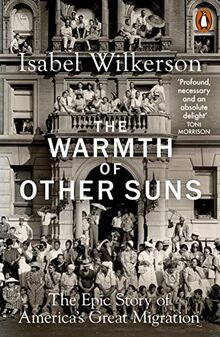
'A landmark piece of non-fiction' Janet Maslin, The New York Times
From the winner of the Pulitzer Prize, this is one of the great untold stories of American history: the migration of black citizens who fled the south and went north in search of a better life
From 1915 to 1970, an exodus of almost six million people would change the face of America. With stunning historical detail, Pulitzer prize-winning journalist Isabel Wilkerson gives us this definitive, vividly dramatic account of how these journeys unfolded.
Based on interviews with more than a thousand people, and access to new data and official records, The Warmth of Other Suns tells the story of America's Great Migration through the lives of three unique individuals: Ida Mae Gladney, who in 1937 left sharecropping and prejudice in Mississippi for Chicago, where she achieved quiet blue-collar success and, in old age, voted for Barack Obama when he ran for an Illinois Senate seat; sharp and quick-tempered George Starling, who in 1945 fled Florida for Harlem, where he endangered his job fighting for civil rights, saw his family fall, and finally found peace in God; and Robert Foster, who left Louisiana in 1953 to pursue a medical career, the personal physician to Ray Charles as part of a glitteringly successful medical career.
Wilkerson brilliantly captures their first treacherous and exhausting cross-country journeys, as well as how they changed their new homes forever.
'You will never forget these people' Gay Talese
'A brilliant and stirring epic' John Stauffer, Wall Street Journal
'The mass migration of African Americans out of the US south forever changed the country's cultural fabric - and Wilkerson's history of this period is full of sacrifice and hope ... a long overdue account' Lettecha Johnson, Guardian
'A deeply affecting, finely crafted and heroic book. . . .Wilkerson has taken on one of the most important demographic upheavals of the past century and told it through the lives of three people ... lyrical and tragic' Jill Lepore, New Yorker